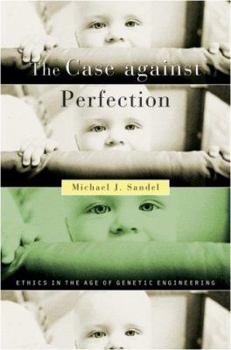The Case Against Perfection: Ethics in the Age of Genetic Engineering
Select Format
Select Condition 
Book Overview
"Sandel explores a paramount question of our era: how to extend the power and promise of biomedical science to overcome debility without compromising our humanity. His arguments are acute and... This description may be from another edition of this product.
Format:Hardcover
Language:English
ISBN:067401927X
ISBN13:9780674019270
Release Date:May 2007
Publisher:Belknap Press
Length:162 Pages
Weight:0.54 lbs.
Dimensions:0.8" x 4.8" x 7.3"
Customer Reviews
5 ratings
Very impressive
Published by Thriftbooks.com User , 14 years ago
I was very impressed with the thinking of Professor Sandel in this book. The best part was the last chapter, where in about thirty pages, he makes an eloquent case for embryonic stem cell research. While being respectful of the beliefs of conservatives who oppose it, he shows why their arguments are weak. I liked his analogy of the acorn not being an oak tree just as the embryo is not a baby, even though the oak was an acorn at one time. This is a serious, well-reasoned, intellectual book.
The Case Against Perfection: Ethics in the Age of Genetic Engineering
Published by Thriftbooks.com User , 14 years ago
Fast deliverly, I needed this book my Bioethics class and got it just in time. Thanks!
Perfect Debate
Published by Thriftbooks.com User , 15 years ago
A Case Against Perfection, which I read in two sittings over 5 hours in one afternoon. I simply could not put the book down, Sandel proposes both sides in the debate of Cloning/Perfomance Enhancement/Gene Therapy etc... Sandel makes you guess and second guess, then triple guess your own beliefs on these issues. In the end, I felt well informed and satisfied with this book. I strongly recommend this book. Not lengthy, fast read, well written. Enjoy.
An Interesting, Incomplete Presentation
Published by Thriftbooks.com User , 16 years ago
This book is quite interesting, it's written in a readable style, and it presents lots of "food for thought" if you read it carefully. The author attempts (fairly successfully) to be balanced although he does take a side (obviously, based on the title). It's probably one of the better presentations on "big ideas" relevant to the future of eugenics. The conclusion is somewhat perfunctory and there is (seemingly extraneous and unconvincing) preaching in favor of stem cell research, but otherwise it's definitely worth reading if you're interested in genethics.
A new moral vision begins to take shape...
Published by Thriftbooks.com User , 16 years ago
This is a small but very impressive book: timely, interesting, original, extremely well informed, very clearly written, organized, and argued, and largely persuasive. Reading it (in two sittings) was like listening to the two best applied ethics lectures I've ever heard (and I've heard lots). I strongly recommend this book. It seemed to me, nonetheless, that one of the main moral criteria Sandel relies on got a bit blurred by the end. The distinction between manipulative molding (bad) and respectful beholding (good) seems to me to draw the line of moral permissibility too far into passivity territory. It'd be better to recognize, as Sandel does in the nice appendix on the stem cell debate, that there are molding beholdings or respectful manipulations, i.e., active interventions that respect and help develop the intrinsic capacitites at issue. But if the mold/behold dichotomy blurs that way, it would seem to undermine the hard and original line Sandel takes against bioengineering in the main part of the book. It would suggest, instead, that we could indeed allow some forms of genetic enhancement so long as they respect the intrinsic excellences we decide matter most. (How we are to decide that is a tricky issue broached but not delved into in this book.) If this is right, however, it would put Sandel much closer to the liberal eugenicists he criticizes. In the end, I think Sandel's book is great: insightful, thought-provoking, and largely persuasive. Sandel articulates an original and deeply humane vision that ethicists, politicians, and other thinking citizens very much need to hear -- and then develop further. (Interestingly, Sandel's ethical vision seems surprisingly close to the later Heidegger in several crucial respects; the book suggests that he was influenced by a Heideggerian theologian and some brilliant undergraduate at Harvard, but I'd guess there's more to it than that.)





